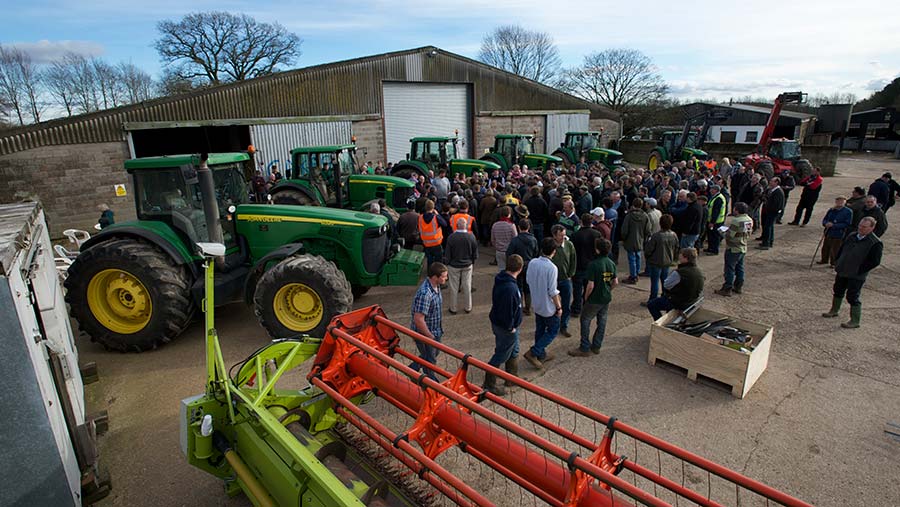Planning a farm dispersal sale: What you need to know
 © Symonds & Sampson
© Symonds & Sampson Choosing a date, lotting items and organising on-site facilities are all parts of the preparation process for a farm dispersal sale.
Farmers can get a huge amount of support, says Symonds & Sampson auctioneer and agricultural surveyor Greg Ridout, from first contact with an auctioneer through to the end of the sale day.
He advises contacting an auctioneer experienced in this type of sale as soon as possible, to allow a smoother, less stressful experience.
See also: What puts land and property buyers off farms?
Typical peak months for these sales coincide with tenancy end dates, which are often in the autumn, as many sales involve farm tenants who are retiring or leaving the holding.
When selling a farm, the dispersal tends to take place when the farm has been sold or the sale agreed, and the Symonds & Sampson team has 10 farm dispersal sales scheduled in the next seven weeks.
How to prepare
The auctioneer will first need to visit the farm, take a look at the items for sale, get an approximate value, and set a commission rate.
Some auctioneers charge a flat rate for the sale, some will charge in bands (for example, 0-£10,000, £10,001-£20,000 etc), and some set a price depending on the value of the lot.
Once this has all been confirmed, they will reserve a date that doesn’t clash with other nearby sales, as well as contacting people they know who might be interested in bidding.
“Realistically the quickest things can be sorted is three weeks, but it’s best to have a couple of months so there’s more time to advertise,” said Mr Ridout.
“We need to outline what will be included in the sale and then we can expand on what you have got nearer the time.”
Catalogues are sent out two weeks beforehand.
Depending on the auctioneer, the farmer can expect help with all on-site preparations for the sale or for attendance just before and during the day of the sale.
For example, some auctioneers can assist the landowner with collecting the items, making them sale-ready and creating lots.
“The small things can take weeks to get out of the sheds, whereas the bigger things you can just drive out,” said Mr Ridout.
“We can help bring items out and clean them, and some farmers will get valeters in for tractors.
“The farmer will put them into lots and we can advise on changing that if necessary.”
What happens on the day?
A decent access route and suitable place for parking need to be available for those attending the sale. If this isn’t possible, there are ways around it, such as using a neighbour’s field for parking or a neighbour’s farm for the sale.
Check if the auctioneer can organise additional facilities, such as a catering unit and portable toilets, and whether these will incur extra costs.
The best way to have a sale is to put every item you have into it, says Mr Ridout, rather than taking certain items to specialist sales where they may lose their identity.
Gaining commission on the sales prices means the auctioneer has to balance getting the best amount for the vendor with maintaining the respect of the buyers.
Full payment is due on the day unless prearranged otherwise.
“Machinery is so expensive now that we’ll often have an interested buyer call and ask if we’re happy to communicate with a finance company, and it all gets agreed ahead of time,” said Mr Ridout.
Typically the seller will receive a payment on account by cheque within a couple of days of the sale, with all proceeds being paid out once all costs have been received (usually within three to four weeks).
Other things to consider
If the farm’s catalogue doesn’t warrant its own sale, multiple businesses looking to sell in the surrounding area can take part in the same auction.
Two years ago, Symonds & Sampson had one farmer bring their items to a neighbouring farm and two dispersal sales were conducted, one after the other.
This decision should be made not based on the number of lots but on the total value.
“We have seen total values range from about £10,000 to £500,000 but it will vary each year,” said Mr Ridout.
Top tips
- Always go to a specialist experienced in farm dispersal sales. They will know what they’re doing, have the right contacts and have the facilities.
- The longer the notice period you can give the auctioneer the better: it’s a lot less stressful, there are more opportunities for marketing, and there is a better chance of getting people to attend.
- Speak to your accountant about any tax considerations before the sale, especially in regards to entrepreneurs’ relief if you are retiring.
- Ahead of the sale, clean and service lot items but also clear up the farm to make it more presentable – because first impressions count.
- A good time to hold sales is in the winter months when potential buyers are not as busy.
- There are no excuses to not have a farm sale; any perceived issues can be worked around.
Source: Greg Ridout
